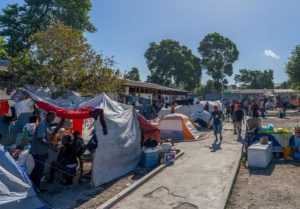Haiti migrant crisis looming as violence escalates
Fears are rising that thousands of people will attempt to make perilous boat journeys in a bid to escape escalating violence in Haiti.
Haiti’s government has been under a state of emergency since groups attacked the country’s largest prison in Port-au-Prince earlier this month, killing and injuring police and prison staff and allowing more than 3,500 inmates to escape.
Gangs now control 80 per cent of Haiti’s capital, according to United Nations estimates. The chaos has forced tens of thousands to flee their homes, adding to the more than 300,000 already displaced by gang violence.
The US Government has been preparing for a mass migration event, dusting off plans to cope with an expected armada of irregular arrival.
Migrants from Haiti would most likely attempt to reach Florida by sea in a journey that can be perilous, and the US is weighing plans to take those interdicted at sea and transport them to Guantanamo Bay for processing and potential repatriation.
A US Homeland Security Department spokesperson told media that so far, migration from the Caribbean remains low.
“DHS is monitoring the situation in Haiti and coordinating closely with the State Department and international partners. At this time, irregular migration flows through the Caribbean remain low,” the spokesperson said.
“Those interdicted at sea are subject to immediate repatriation pursuant to our longstanding policy and procedures. The United States returns or repatriates migrants interdicted at sea to The Bahamas, Cuba, the Dominican Republic, and Haiti.”
Earlier this week, the embattled Prime Minister of Haiti, Ariel Henry, said he will resign, paving the way toward a political transition in Haiti that the international community has called for.
Meanwhile, the Biden administration is bracing for a mass migration event at a time when federal resources are already strapped, and key immigration agencies are low on funds.
 The UN’s migration agency IOM recently reported that 15,000 people have been displaced within just one week, all of them having already experienced displacement.
The UN’s migration agency IOM recently reported that 15,000 people have been displaced within just one week, all of them having already experienced displacement.
“Ten displacement sites have been entirely emptied due to the successive waves of violence, leaving displaced families traumatized. Urgent needs include access to food, healthcare, water, and hygiene facilities, and psychological support,” IOM said.
“More than 160,000 people are currently displaced in the Port-au-Prince metropolitan area.
“Haitians are unable to lead a decent life. They are living in fear, and every day, every hour this situation carries on, the trauma gets worse.
“Insecurity is growing at the national level: violence in Artibonite, roadblocks in Cap Haitian, and fuel shortages in the South. People living in the capital are locked in, they have nowhere to go. People fleeing cannot reach family members and friends in the rest of the country to find shelter. The capital is surrounded by armed groups and danger. It is a city under siege,” IOM said.
The collapsing health system, attacks on hospitals by the armed groups, and the lack of mental health services further exacerbate the humanitarian crisis.
Some hospitals have been run over by gangs and had to evacuate staff and patients, including newborns. Medical professionals across the capital are sounding the alarm as their capacity to deliver even the most basic medical services is severely diminished. Among the most basic medical services, the need for psychosocial support is dire.
Across Haiti, 362,000 people are currently internally displaced, some of them several times over increase household vulnerability. This is 15 per cent more since the beginning of the year.
More than half of them, 180,000, are children, a group particularly vulnerable. Lack of goods and resources is amplifying an already precarious economic situation. Each new location presents new adaptation challenges, such as access to water and basic services. Families must constantly adapt, raising stress and anxiety.












